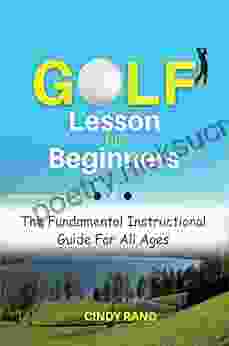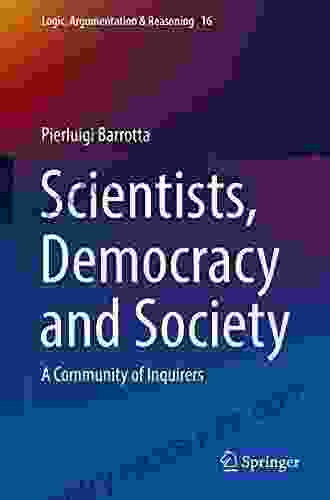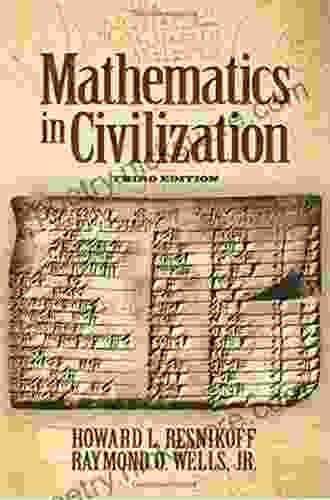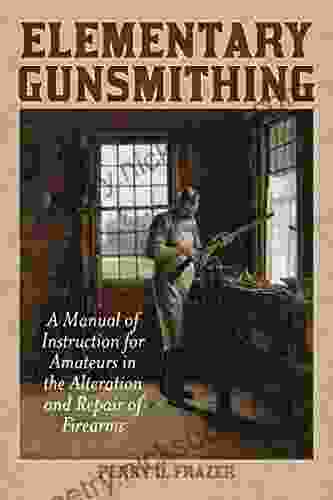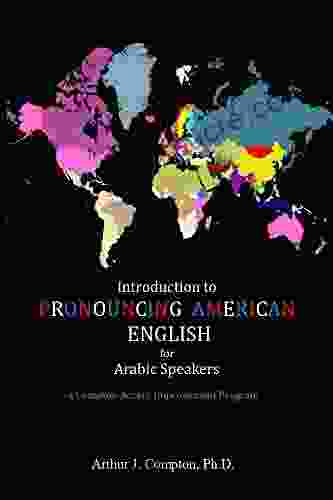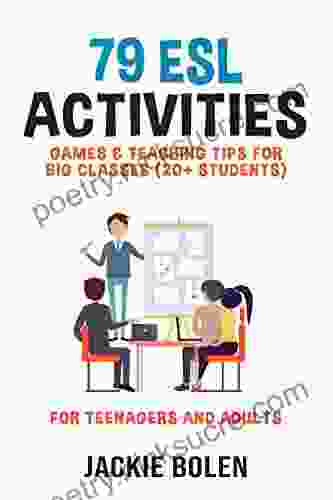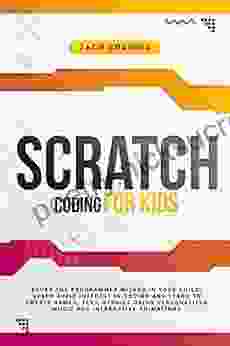The Fundamental Instructional Guide For All Ages

4.6 out of 5
| Language | : | English |
| File size | : | 2923 KB |
| Text-to-Speech | : | Enabled |
| Screen Reader | : | Supported |
| Enhanced typesetting | : | Enabled |
| Word Wise | : | Enabled |
| Print length | : | 79 pages |
| Lending | : | Enabled |
Learning and development are lifelong processes that extend far beyond the confines of traditional schooling. This comprehensive instructional guide provides a strong foundation for learning and development, tailored to meet the needs of learners of all ages. From early childhood education to lifelong learning, this guide offers valuable insights, strategies, and resources to empower individuals throughout their educational journeys.
Early Childhood Education (Ages 0-8)
The Importance of Play
Play is essential for early childhood development. It helps children develop their physical, cognitive, social, and emotional skills. Through play, children can explore their world, learn new things, and develop their imaginations. Parents and caregivers can encourage play by providing children with a variety of toys and materials, and by setting aside time each day for unstructured play.
Literacy and Language Development
Literacy and language development are also important in early childhood. Children who are exposed to books and language-rich environments are more likely to develop strong reading and writing skills. Parents and caregivers can help children develop their literacy skills by reading to them regularly, talking to them about their experiences, and providing them with opportunities to practice writing.
Math and Science Exploration
Math and science exploration is another important aspect of early childhood education. Children can learn about math and science through everyday activities, such as counting, measuring, and exploring the natural world. Parents and caregivers can encourage math and science exploration by providing children with opportunities to play with blocks, puzzles, and other math and science toys.
Elementary School (Ages 6-11)
Foundational Skills
In elementary school, children continue to develop their foundational skills in reading, writing, math, and science. They also begin to learn about social studies, history, and the arts. Teachers and parents can support children's learning by providing them with opportunities to practice their skills, and by encouraging them to ask questions and explore their interests.
Critical Thinking and Problem Solving
Critical thinking and problem solving are important skills for students of all ages. Children can develop these skills by working on problems, asking questions, and coming up with their own solutions. Teachers and parents can encourage critical thinking and problem solving by providing children with opportunities to work on challenging tasks, and by asking them to explain their thinking.
Collaboration and Communication
Collaboration and communication are also important skills for students in elementary school. Children can learn to collaborate and communicate by working on projects with classmates, and by participating in discussions and group activities. Teachers and parents can encourage collaboration and communication by providing children with opportunities to work together, and by giving them opportunities to share their ideas and opinions.
Middle School (Ages 11-14)
Transition to Secondary Education
Middle school is a time of transition for students. They are moving from elementary school to secondary school, and they are beginning to take on more responsibility for their own learning. Students in middle school need to develop strong study skills and time management skills in order to succeed.
Exploration of Interests
Middle school is also a time for students to explore their interests. They can take elective courses in a variety of subjects, such as art, music, drama, and foreign languages. Students can also participate in extracurricular activities, such as sports, clubs, and community service.
Social and Emotional Development
Social and emotional development is also important in middle school. Students are beginning to develop their own identities, and they are starting to form closer relationships with their peers. Students in middle school need support from their teachers, parents, and peers in order to navigate the social and emotional challenges of adolescence.
High School (Ages 14-18)
College and Career Readiness
In high school, students begin to prepare for college and careers. They take more challenging courses, and they begin to develop their own career interests. Students in high school need to develop strong academic skills, as well as the skills they need to succeed in the workforce.
Exploration of College and Career Options
Students in high school can explore college and career options by taking career assessments, visiting colleges, and talking to professionals in different fields. They can also participate in internships and apprenticeships, which can give them hands-on experience in a particular field.
Making Informed Decisions
Students in high school need to make informed decisions about their future. They need to choose the right courses, and they need to start thinking about what they want to do after high school. Students in high school need support from their teachers, parents, and counselors in order to make informed decisions about their future.
Lifelong Learning (Ages 18+)
Continuing Education
Learning does not stop after high school. In fact, lifelong learning is becoming increasingly important in today's world. Adults can continue their education by taking classes at a community college or university, or by taking online courses.
Professional Development
Adults can also continue their education by pursuing professional development opportunities. These opportunities can help adults stay up-to-date on the latest trends in their field, and they can also help adults advance their careers.
Personal Growth and Enrichment
Lifelong learning can also be a source of personal growth and enrichment. Adults can learn new skills, explore new hobbies, and meet new people through lifelong learning.
This instructional guide provides a comprehensive overview of learning and development for all ages. From early childhood education to lifelong learning, this guide offers valuable insights, strategies, and resources to empower individuals throughout their educational journeys. By following the advice in this guide, you can help yourself or your child achieve academic success and lifelong learning goals.
Additional Resources:
- Edutopia
- Khan Academy
- Coursera
- edX
- Udemy
4.6 out of 5
| Language | : | English |
| File size | : | 2923 KB |
| Text-to-Speech | : | Enabled |
| Screen Reader | : | Supported |
| Enhanced typesetting | : | Enabled |
| Word Wise | : | Enabled |
| Print length | : | 79 pages |
| Lending | : | Enabled |
Do you want to contribute by writing guest posts on this blog?
Please contact us and send us a resume of previous articles that you have written.
 Fiction
Fiction Non Fiction
Non Fiction Romance
Romance Mystery
Mystery Thriller
Thriller SciFi
SciFi Fantasy
Fantasy Horror
Horror Biography
Biography Selfhelp
Selfhelp Business
Business History
History Classics
Classics Poetry
Poetry Childrens
Childrens Young Adult
Young Adult Educational
Educational Cooking
Cooking Travel
Travel Lifestyle
Lifestyle Spirituality
Spirituality Health
Health Fitness
Fitness Technology
Technology Science
Science Arts
Arts Crafts
Crafts DIY
DIY Gardening
Gardening Petcare
Petcare Hope Comerford
Hope Comerford Steven Callahan
Steven Callahan P M Gilbert
P M Gilbert Stefanie Japel
Stefanie Japel Stacey Williams
Stacey Williams Cade Courtley
Cade Courtley Tyler Richards
Tyler Richards Steven G Krantz
Steven G Krantz Stuart Tomlinson
Stuart Tomlinson Patrick Torsell
Patrick Torsell Anna Watson
Anna Watson Philip Gibson
Philip Gibson Donna D Ignatavicius
Donna D Ignatavicius Timothy P Schultz
Timothy P Schultz Janine Marsh
Janine Marsh Junior Health Institute
Junior Health Institute Tali Sharot
Tali Sharot Susan Spicer
Susan Spicer Shannon Vallor
Shannon Vallor Chris Bailey
Chris Bailey Walter Mischel
Walter Mischel Dr Sarita Uhr
Dr Sarita Uhr Anna Flores Locke
Anna Flores Locke Sean Covey
Sean Covey Seth Stephens Davidowitz
Seth Stephens Davidowitz Claire Walter
Claire Walter Asker Jeukendrup
Asker Jeukendrup Ian Moulding
Ian Moulding Stephen J Pyne
Stephen J Pyne Mishka Shubaly
Mishka Shubaly Charles Dickens
Charles Dickens Sherry B Ortner
Sherry B Ortner Todd Denault
Todd Denault Melvin Fitting
Melvin Fitting Harnarayan Singh
Harnarayan Singh John O Sullivan
John O Sullivan Katie Krimer Ma Lcsw
Katie Krimer Ma Lcsw Joy Dawson
Joy Dawson John Edwards
John Edwards Mark Matlock
Mark Matlock Eric Greitens
Eric Greitens Anna Lowenhaupt Tsing
Anna Lowenhaupt Tsing L A Cotton
L A Cotton John Murray
John Murray Rebecca Carroll
Rebecca Carroll Matthew Locricchio
Matthew Locricchio Ken Robinson
Ken Robinson Julian Of Norwich
Julian Of Norwich Eddie Jones
Eddie Jones Zach Codings
Zach Codings Dan Vogel
Dan Vogel Zach Davis
Zach Davis Sajni Patel
Sajni Patel Scott Allan
Scott Allan Lisa Manterfield
Lisa Manterfield Adil E Shamoo
Adil E Shamoo Illustrated Edition Kindle Edition
Illustrated Edition Kindle Edition Larry Thornberry
Larry Thornberry Joshua Shifrin
Joshua Shifrin Cb Droege
Cb Droege Arcturus Publishing
Arcturus Publishing Sukhveer Singh
Sukhveer Singh Eleanor J Sullivan
Eleanor J Sullivan Lori L Tharps
Lori L Tharps Barb Musick
Barb Musick Sally Black
Sally Black Julian Havil
Julian Havil Annaka Harris
Annaka Harris Bruce Lockwood
Bruce Lockwood College Hippo
College Hippo Tara Haelle
Tara Haelle Sarah Stodola
Sarah Stodola Graham Robb
Graham Robb Larry Semento
Larry Semento Steve Bennett
Steve Bennett Damian Hall
Damian Hall Vittal S Anantatmula
Vittal S Anantatmula Joey Myers
Joey Myers Nicholas Clapp
Nicholas Clapp Josephine Mccarthy
Josephine Mccarthy M Terese Verklan
M Terese Verklan Louise Katz
Louise Katz Jay Spence
Jay Spence William P Young
William P Young Jonathan Franklin
Jonathan Franklin Jackie Bolen
Jackie Bolen Boye Lafayette De Mente
Boye Lafayette De Mente Valerie Hansen
Valerie Hansen Curtis Collins
Curtis Collins Nisha Garg
Nisha Garg Ruby Mcconnell
Ruby Mcconnell Scott Shupe
Scott Shupe Carl Mckeating
Carl Mckeating Peter L Falkingham
Peter L Falkingham J Scott Long
J Scott Long June Hur
June Hur John Gignilliat
John Gignilliat Richard A Ruth
Richard A Ruth Ellen Painter Dollar
Ellen Painter Dollar Richard Mcafee
Richard Mcafee Jill Lepore
Jill Lepore Zena Hitz
Zena Hitz Jennifer Dugan
Jennifer Dugan Ralph Waldo Emerson
Ralph Waldo Emerson Katharine Beals
Katharine Beals L J Martin
L J Martin Elisabeth Haich
Elisabeth Haich Jonathan R Brennan
Jonathan R Brennan Susan M Schneider
Susan M Schneider Richard Appleton
Richard Appleton Bella Forrest
Bella Forrest Christina Henry De Tessan
Christina Henry De Tessan Caryl Phillips
Caryl Phillips Crystal Cook
Crystal Cook Dan Gardner
Dan Gardner Christopher T Coughlin
Christopher T Coughlin Roy R Grinker
Roy R Grinker Tony Osgood
Tony Osgood Steve Bowkett
Steve Bowkett Tim Cahill
Tim Cahill Kalman Samuels
Kalman Samuels Caroline Miller
Caroline Miller Malcolm S Thaler
Malcolm S Thaler M Shawn Copeland
M Shawn Copeland Joyce Meyer
Joyce Meyer Christine Hopfgarten
Christine Hopfgarten Anna Wood
Anna Wood Chris Gore
Chris Gore Randy J Paterson
Randy J Paterson Genevieve Mckay
Genevieve Mckay Helen Adrienne
Helen Adrienne Mark Mckinney
Mark Mckinney Marie Cirano
Marie Cirano Illysa R Foster
Illysa R Foster Tim Young
Tim Young Wayne C Booth
Wayne C Booth James Burke
James Burke Ann Zaprazny
Ann Zaprazny Clive Scarff
Clive Scarff Les Livingstone
Les Livingstone Martin Meredith
Martin Meredith Jessa Stone
Jessa Stone Fox Fisher
Fox Fisher Dorothy Ours
Dorothy Ours John Baichtal
John Baichtal Heidi Kreider
Heidi Kreider Barbara Sealock
Barbara Sealock C W Farnsworth
C W Farnsworth Melissa Mortenson
Melissa Mortenson Michael Tan
Michael Tan Ralph Cockburn
Ralph Cockburn Randall Fitzgerald
Randall Fitzgerald Richard A Swanson
Richard A Swanson Peter Watson
Peter Watson L Chapman
L Chapman Gary Chapman
Gary Chapman Julie Creffield
Julie Creffield Steve Schwartz
Steve Schwartz Lexi Ryan
Lexi Ryan Jennifer Kostick
Jennifer Kostick Anna B Doe
Anna B Doe C J Brown
C J Brown James C Scott
James C Scott Antonio Robert
Antonio Robert Isaac Fitzsimons
Isaac Fitzsimons Darcie Little Badger
Darcie Little Badger Helen E Lees
Helen E Lees Stacey A Shannon
Stacey A Shannon Silvia M Lindtner
Silvia M Lindtner Ann Voskamp
Ann Voskamp Paulo Guillobel
Paulo Guillobel Pradeepa Narayanaswamy
Pradeepa Narayanaswamy Bob Madgic
Bob Madgic Earl Hipp
Earl Hipp James P Sethna
James P Sethna Dana James
Dana James James F Twyman
James F Twyman Darryl Belfry
Darryl Belfry John Pullen
John Pullen Lizzie Collingham
Lizzie Collingham Robert F Boszhardt
Robert F Boszhardt Fumio Sasaki
Fumio Sasaki Jenny Jacobs
Jenny Jacobs Gwen Mckee
Gwen Mckee Glen E Clarke
Glen E Clarke Dannah Gresh
Dannah Gresh Rick Page
Rick Page Omari Bouknight
Omari Bouknight Mordecai Orimiladeye
Mordecai Orimiladeye Chic Scott
Chic Scott Robin Esrock
Robin Esrock Kathy Morey
Kathy Morey Sean Purchase
Sean Purchase Bob Cary
Bob Cary L J Smith
L J Smith Finn Aagaard
Finn Aagaard Joanna Wells
Joanna Wells Margaret Paul
Margaret Paul Anna Della Subin
Anna Della Subin Bethany Saltman
Bethany Saltman Kennedy Achille
Kennedy Achille Christine Field
Christine Field Kristina Cowan
Kristina Cowan David Soucie
David Soucie Wendy Leo Smith
Wendy Leo Smith Robert A Cook
Robert A Cook Paul Logothetis
Paul Logothetis Sally Annjanece Stevens
Sally Annjanece Stevens E R Truitt
E R Truitt John Van Wyhe
John Van Wyhe Barry Schwartz
Barry Schwartz Jackson Carter
Jackson Carter Alexander L Chapman
Alexander L Chapman Dante Fortson
Dante Fortson Horace Kephart
Horace Kephart Barry Dainton
Barry Dainton Daphne Poltz
Daphne Poltz Maya Van Wagenen
Maya Van Wagenen Linda K Miller
Linda K Miller Annalyn Ng
Annalyn Ng Sharman Apt Russell
Sharman Apt Russell Sally Connolly
Sally Connolly Becky Wade
Becky Wade Sharon Rowley
Sharon Rowley Freddy Silva
Freddy Silva Sam Demas
Sam Demas Philip Reed
Philip Reed Miley Smiley
Miley Smiley Ray Eye
Ray Eye Michael G Manning
Michael G Manning Melanie Dickerson
Melanie Dickerson Guy Windsor
Guy Windsor Mike Roberts
Mike Roberts Michael Labossiere
Michael Labossiere Sandy Bodeau
Sandy Bodeau Stefan Hollos
Stefan Hollos George Lakoff
George Lakoff Michael Witwer
Michael Witwer H M Schey
H M Schey H Jerome Chapman
H Jerome Chapman Anna Quindlen
Anna Quindlen Mike Reilly
Mike Reilly Gloria Chadwick
Gloria Chadwick Pawel Malczewski
Pawel Malczewski Douglas Perry
Douglas Perry Anne Sylvie Malbrancke
Anne Sylvie Malbrancke Michael F Nenes
Michael F Nenes Barak A Bassman
Barak A Bassman Geoff Greig
Geoff Greig Linda Lewis Alexander
Linda Lewis Alexander Kristen L Mauk
Kristen L Mauk Will Kurt
Will Kurt Julie Plagens
Julie Plagens Anna Crowley Redding
Anna Crowley Redding Jennifer L Lopez
Jennifer L Lopez Emily J Taylor
Emily J Taylor Tanmay Mehta
Tanmay Mehta Ann Valett
Ann Valett Luke Schumacher
Luke Schumacher Noel D Justice
Noel D Justice Holly Chism
Holly Chism Dean Buonomano
Dean Buonomano Oskar Morgenstern
Oskar Morgenstern Mikael Lindnord
Mikael Lindnord Sparknotes
Sparknotes Julie C Meloni
Julie C Meloni Kate Mcvaugh
Kate Mcvaugh Chronicle Books
Chronicle Books Annette Burns
Annette Burns Sean Bartram
Sean Bartram Quinn Loftis
Quinn Loftis Emmett W Hines
Emmett W Hines Daniel Isberner
Daniel Isberner Gilbert J Grant Md
Gilbert J Grant Md Richard C Schwartz
Richard C Schwartz Lily Dunn
Lily Dunn Jonathan Pd Buckley
Jonathan Pd Buckley Margaret Rogerson
Margaret Rogerson Jason
Jason Steve Grant
Steve Grant Christopher Seddon
Christopher Seddon Ichigo Takano
Ichigo Takano Hanumant Deshmukh
Hanumant Deshmukh Rick Sparkman
Rick Sparkman Maggie Downs
Maggie Downs Roy M Wallack
Roy M Wallack Steven Munatones
Steven Munatones Good Books
Good Books Shawn Shallow
Shawn Shallow Dr Harper
Dr Harper Pierluigi Barrotta
Pierluigi Barrotta Peter Hathaway Capstick
Peter Hathaway Capstick Rutger Bregman
Rutger Bregman Jay Young
Jay Young Worley Faver
Worley Faver Frances Schultz
Frances Schultz Sara Wickham
Sara Wickham Neal Shusterman
Neal Shusterman Chase Hassen
Chase Hassen Holly Bourne
Holly Bourne Horace Freeland Judson
Horace Freeland Judson Jack Perconte
Jack Perconte Henry Dillon
Henry Dillon Jenn Bennett
Jenn Bennett Michael Burnett
Michael Burnett Patricia Ladis
Patricia Ladis James C Zimring
James C Zimring Susan G Solomon
Susan G Solomon Kristian Berg
Kristian Berg Lane Demas
Lane Demas Suzanne I Barchers
Suzanne I Barchers Hannah Testa
Hannah Testa Ray Moynihan
Ray Moynihan John Yates
John Yates Lina Beard
Lina Beard Judy Corry
Judy Corry Ford R Bryan
Ford R Bryan Hill Harper
Hill Harper Aaron Mahnke
Aaron Mahnke Adele Faber
Adele Faber Peter Wacht
Peter Wacht Dave Hughes
Dave Hughes Helge Kragh
Helge Kragh Creative Guy
Creative Guy Reinhard Kleist
Reinhard Kleist Dan Koboldt
Dan Koboldt Patricia Romanowski Bashe
Patricia Romanowski Bashe George James Grinnell
George James Grinnell John Dunn
John Dunn Kendall Coyne
Kendall Coyne Suzanne Clark
Suzanne Clark Sheela Raja
Sheela Raja Jacqueline Winslow
Jacqueline Winslow Victor Stringer
Victor Stringer Howard Means
Howard Means Naomi Tomky
Naomi Tomky Vladimir Vasiliev
Vladimir Vasiliev Charles J Sanders
Charles J Sanders Anna Grafl
Anna Grafl William Goldman
William Goldman Brian Daccord
Brian Daccord Prime Hall
Prime Hall Michael Hodgson
Michael Hodgson J E Esslemont
J E Esslemont R K Agarwal
R K Agarwal Jemar Tisby
Jemar Tisby Ann Marie Brown
Ann Marie Brown Jacob Ward
Jacob Ward Paul Bloom
Paul Bloom Skeleton Steve
Skeleton Steve Alex Bromley
Alex Bromley Peyton Curley
Peyton Curley Charlene Beswick
Charlene Beswick Dave Whitlock
Dave Whitlock Steve Olson
Steve Olson Timothy Ellis
Timothy Ellis Mary E Pearson
Mary E Pearson Steve Oldenburg
Steve Oldenburg Dave Canterbury
Dave Canterbury Bernard Stiegler
Bernard Stiegler Christelle Dabos
Christelle Dabos David Berry
David Berry Laurie Varga
Laurie Varga R A Salvatore
R A Salvatore Nelson Dellis
Nelson Dellis David Woods
David Woods Scott P Sells
Scott P Sells Marjorie Savage
Marjorie Savage Steven A Fino
Steven A Fino Stephen Tarsitano
Stephen Tarsitano The Pinnacle Review
The Pinnacle Review Jean Barbre
Jean Barbre Jeff Kuehl
Jeff Kuehl Bren Smith
Bren Smith Stephanie Cave
Stephanie Cave Matthew Rudy
Matthew Rudy Zoe Moore
Zoe Moore Tarani Chandola
Tarani Chandola Geryn Childress
Geryn Childress Cathy Glass
Cathy Glass Marva Boatman
Marva Boatman Zach Hunter
Zach Hunter Susan Straub
Susan Straub Monroe Wildrose
Monroe Wildrose Kyung Won Chung
Kyung Won Chung Roger Hall
Roger Hall Angela Saini
Angela Saini Jenna Evans Welch
Jenna Evans Welch Dave Hall
Dave Hall Chris Fregly
Chris Fregly Nicholas Thomas
Nicholas Thomas John Dickson
John Dickson Shelley Emling
Shelley Emling Nancy Marie White
Nancy Marie White Justine Gregory Williams
Justine Gregory Williams Annabel Streets
Annabel Streets Ellen Dugan
Ellen Dugan Craig Ramsay
Craig Ramsay Louis Van Dyke
Louis Van Dyke Danny Jones
Danny Jones Martin N Seif
Martin N Seif Morton Manus
Morton Manus Steven Yellin
Steven Yellin Karen Bassie Sweet
Karen Bassie Sweet Lisa Randall
Lisa Randall Krista Marson
Krista Marson Steve Newell
Steve Newell Lily Siou
Lily Siou Harley Mcallister
Harley Mcallister Ariel Dalfen
Ariel Dalfen Sara Dyer
Sara Dyer W W Sawyer
W W Sawyer Sandy Camillo
Sandy Camillo Todd Radom
Todd Radom Winton Porter
Winton Porter Julie A Ross
Julie A Ross Robert Gerver
Robert Gerver Robert A Conover
Robert A Conover Stan Gibilisco
Stan Gibilisco Buddy Lee
Buddy Lee Anna Ivey
Anna Ivey Robby Weber
Robby Weber Breeda Bermingham
Breeda Bermingham Jay Allan
Jay Allan Ben Shneiderman
Ben Shneiderman Suzanne Girard Eberle
Suzanne Girard Eberle Gemma Bray
Gemma Bray Bert Mendelson
Bert Mendelson Gill James
Gill James Elizabeth Wissner Gross
Elizabeth Wissner Gross Rebecca A Moyes
Rebecca A Moyes Thomas A Garrity
Thomas A Garrity Julia Galef
Julia Galef Anna Bright
Anna Bright Trevor Hartman
Trevor Hartman Johnny Chuong
Johnny Chuong Harold Davis
Harold Davis Joe Hyams
Joe Hyams Ling Seto
Ling Seto Kass Morgan
Kass Morgan Matthew Cobb
Matthew Cobb Neel Doshi
Neel Doshi Peter Richmond
Peter Richmond Bob Labbe
Bob Labbe Margaret Jean Langstaff
Margaret Jean Langstaff G Norman Lippert
G Norman Lippert Frank Thomas
Frank Thomas Livia Bitton Jackson
Livia Bitton Jackson Paul Mendelson
Paul Mendelson Ann Mccallum Staats
Ann Mccallum Staats
Light bulbAdvertise smarter! Our strategic ad space ensures maximum exposure. Reserve your spot today!

 Tony Carter101 Best Jump Rope Workouts: The Ultimate Guide to Burning Calories, Building...
Tony Carter101 Best Jump Rope Workouts: The Ultimate Guide to Burning Calories, Building... Garrett PowellFollow ·15.5k
Garrett PowellFollow ·15.5k Ricky BellFollow ·9.5k
Ricky BellFollow ·9.5k Tony CarterFollow ·7.9k
Tony CarterFollow ·7.9k Stephen KingFollow ·14.7k
Stephen KingFollow ·14.7k Eric NelsonFollow ·2.5k
Eric NelsonFollow ·2.5k Alan TurnerFollow ·6.5k
Alan TurnerFollow ·6.5k Stan WardFollow ·9.5k
Stan WardFollow ·9.5k William PowellFollow ·11.7k
William PowellFollow ·11.7k
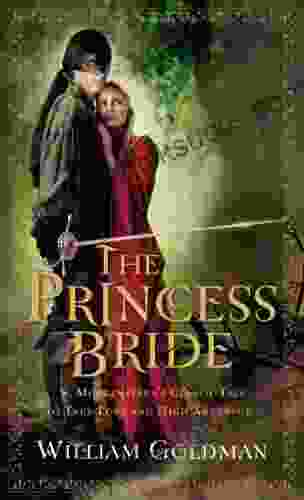
 Aldous Huxley
Aldous HuxleyMorgenstern: A Classic Tale of True Love and High...
Morgenstern is a...
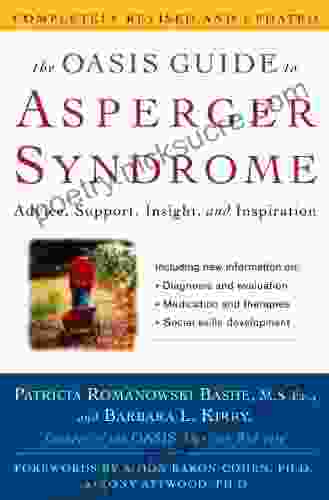
 Beau Carter
Beau CarterThe Oasis Guide to Asperger Syndrome
What is Asperger Syndrome? Asperger...
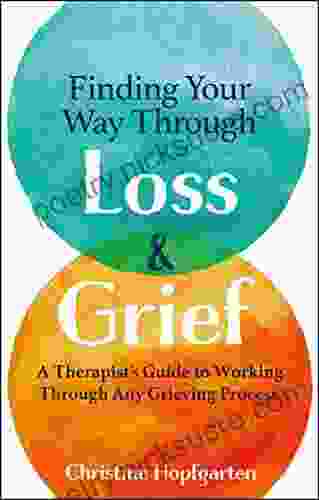
 Chadwick Powell
Chadwick PowellFinding Your Way Through Loss Grief: A Therapist S Guide...
Grief is a natural human emotion that we...
4.6 out of 5
| Language | : | English |
| File size | : | 2923 KB |
| Text-to-Speech | : | Enabled |
| Screen Reader | : | Supported |
| Enhanced typesetting | : | Enabled |
| Word Wise | : | Enabled |
| Print length | : | 79 pages |
| Lending | : | Enabled |


